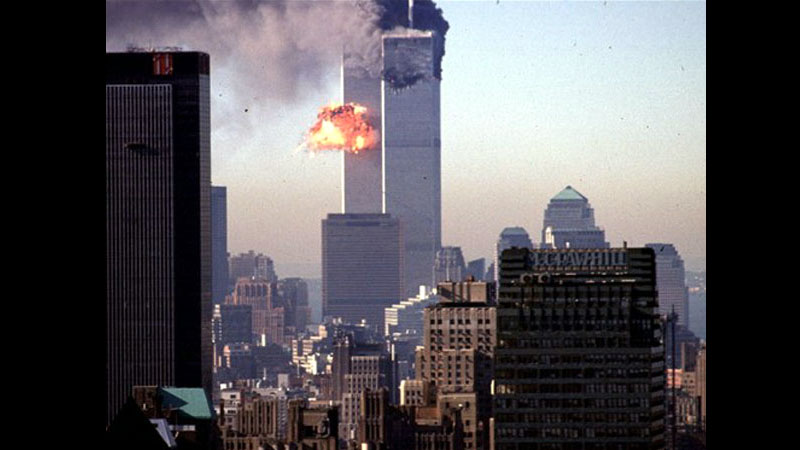
A hijacked commercial plane crashes into the World Trade Center in New York City on September 11, 2001. AFP FILE
WASHINGTON, United States — The 9/11 attacks of 2001 forever changed America and upended its foreign and national security policy, leaving the country for the past 15 years in a war against jihadists — without ending the upheaval in the Middle East.
Barack Obama, who will leave the White House in January, is the president who tried to get the US military out of the quagmires in Iraq and Afghanistan — devastating “war on terror” conflicts launched by his predecessor George W. Bush in the wake of the suicide plane strikes that killed nearly 3,000 people.
But Obama’s legacy on that front is mixed, with US forces still present in both countries.
And while he worked hard to bring America closer to the Muslim world, he will leave office with the United States bogged down in a seemingly endless conflict against Islamists at home and abroad, experts say.
“The evolving threat of Islamist terrorism compelled President Obama, against his own inclinations, to engage militarily in Iraq once again, and since then in Syria and Libya as well,” said Tamara Cofman Wittes, director of the Center for Middle East Policy at the Brookings Institution in Washington.
“The wars in the Middle East, the metastasis of ISIS, online radicalization and a series of attacks in European and American cities have made the paradigm of a ‘global war on terror’ very hard to set aside, even 15 years after 9/11,” she wrote on the World Economic Forum website.
The US is also still engaged militarily, in limited form or on a purely logistical basis, in Afghanistan, Nigeria, Somalia and Yemen to counter myriad threats.
“The thinking of the Obama administration is that big wars make things worse,” Hussein Ibish, a senior resident scholar at the Arab Gulf States Institute, told AFP.
So instead, Obama launched a new era in American warfare — one dominated by drones, special forces and training for local fighters.
The human and financial costs of such engagements are more limited — a significant fact, after the 5,300 US military personnel killed, 50,000 wounded and $1.6 trillion spent from 2001-2014 in Iraq and Afghanistan, according to Congressional data.
Obama’s strategy had its best success in May 2011, when US special forces killed Al-Qaeda leader Obama bin Laden, who masterminded the 9/11 attacks, at his home in Pakistan.
But for Ibish, such a use of “limited resources… looks like a continuous war.”
“It is even more than a permanent war because the limited resources cannot change the instability. It accepts the current chaos as being unsolvable,” he added.
Evolving threats
In Syria, a lasting peace is still not at hand, though a fresh truce brokered by the United States and Russia — both now involved militarily in the deadly conflict — is due to begin Monday.
And a US military re-engagement in the Middle East is not in the plans of either of the candidates looking to succeed Obama — Hillary Clinton and Donald Trump.
Fifteen years after the Twin Towers fell, forever changing New York’s skyline, Obama said the terror threat facing America had “evolved,” referring to lone-wolf attacks in the United States like the nightclub massacre in Orlando in June.
“So in Afghanistan, Iraq, Syria and beyond, we’ll stay relentless against terrorists like Al-Qaeda and ISIL. We will destroy them. And we’ll keep doing everything in our power to protect our homeland,” he said Saturday in his weekly address.
Mass surveillance
As Amy Greene — an American researcher at the prestigious Institute of Political Studies in Paris (Sciences-Po) — pointed out, “there has not been an attack on US soil of the same scale” as the carefully planned 2001 attacks.
Of course, Washington still fears more small-scale attacks carried out by homegrown attackers, like the Orlando shooting that left 49 people dead or the San Bernardino attacks last December that left 14 dead.
Faced with ongoing threats, the United States has built up a massive surveillance apparatus in the post-9/11 era both at home and abroad.
The budget for the CIA, FBI and National Security Agency has nearly doubled since 2001.
“The threat that I think will dominate the next five years for the FBI will be the impact of the crushing of the caliphate, which will happen,” Comey said this past week, referring to the Islamic State group.
Since the passage of the Patriot Act after 9/11, legislation maintained by Obama, “Americans have accepted the idea of giving up some of their freedoms,” Greene said.
According to a survey conducted by the Pew Research Center, 40 percent of Americans fear that “the ability of terrorists to launch another major attack on the United States is greater than it was at the time of the 9/11 attacks.”
That is the highest share expressing that fear since 2002.
On Saturday, the US State Department warned in its regular “worldwide caution” note to travelers on terror risks that the IS group had “called on supporters to attack US citizens and coalition partners wherever they are.”/RGA
RELATED VIDEO